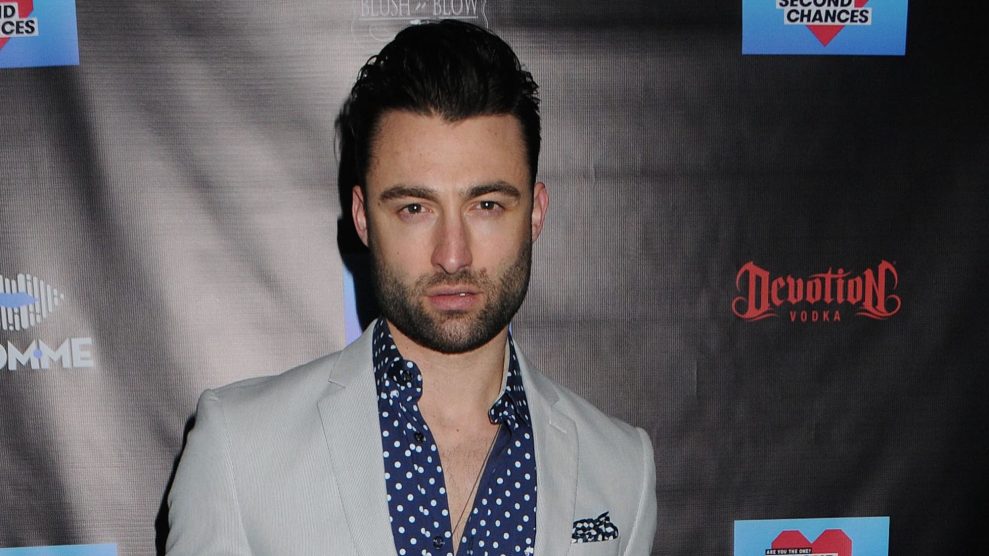
Former model and January 6 riot participant John Strand at the 2017 viewing party for the MTV Network series "Are You The One: Second Chances"Demis Maryannakis/STAR MAX
International underwear model, security guard, and insurrectionist John Strand was finally sentenced to prison today, after being convicted in September on all five criminal counts related to storming the Capitol on January 6. DC District Court Judge Christopher Cooper sentenced Strand to 32 months in prison, plus a $10,000 fine. The fine took into account the fact that Strand had been fundraising off his conviction for legal defense purposes, even though he was being represented by court-appointed counsel paid for by the taxpayers.
During the sentencing, Cooper lectured Strand about trying to cash in on his “49 minutes of infamy,” referring to the time he spent in the Capitol. “I think you want to cultivate and profit from that.” He chastised him for failing to take any responsibility for his actions. The lack of remorse, Cooper noted, is one reason his sentence was longer than it otherwise might have been.
Strand was indicted along with Simone Gold, a Stanford-educated lawyer, and an emergency room physician, who founded the Covid misinformation organization America’s Frontline Doctors. With Strand by her side, she had pushed her way past a fallen police officer into the Capitol on January 6 and stood outside the House chamber doors while the angry mob tried to break in. In March last year, Gold pleaded guilty to a single misdemeanor charge of unlawfully entering and remaining in a restricted area of the US Capitol. She was sentenced in June last year to 60 days in prison.
Strand, however, refused to plead guilty and went to trial in September. On the stand, he claimed that his only reason for entering the Capitol on January 6 was to provide security for Gold, who used a bullhorn to give a speech in the Rotunda while the police tried to clear the rioters out of the building. The jury flatly rejected Strand’s claim after seeing a host of video and photographic evidence and hearing testimony from police officers who were injured while trying to keep them away from members of Congress.
Gold was in the courtroom for the hearing, and donned her sunglasses when Cooper announced Strand’s sentence. She was accompanied by Bob McEwen, a former Ohio congressman who is the executive director of the secretive Council for National Policy, a group whose members had helped promote the rally in Washington on January 6 that preceded the riot. He spent some time comforting Strand after the sentencing and told me that he was there as “a friend.”
In the sentencing memo, the government revealed that Strand has raised more than $17,000 since his conviction for his legal defense, without disclosing that his lawyer is paid for by the taxpayers. Prosecutors had asked the judge to impose a $50,000 fine on Strand to ensure that he didn’t profit from spreading misinformation about the events of January 6. They noted that there’s evidence that Strand had the resources to pay such a fine. He lives rent-free with Gold in a $3.6 million house that Gold purchased with donor money given to her nonprofit group, and which is now at the center of a major legal fight over the group’s future. Cooper ended up fining Strand $10,000.
After Gold went to prison, the AFLDS board conducted a forensic audit of the group’s finances after concerns about her spending. Among its findings was that the group had been paying Strand $10,000 a month, and that he was using the group’s credit cards to run up $15,000 to $17,000 a month in expenses. The board terminated Strand’s employment in the summer of 2022, not long before his conviction, according to legal documents. But Strand’s financial condition remains a mystery, as he failed to file the required disclosure form with the probation office ahead of sentencing, a fact that was raised several times during the sentencing hearing.
Prosecutors had requested that Cooper consider the fact that Strand had shown a distinct lack of remorse for his crimes, despite his court testimony in which he feigned sympathy for the fallen police officers—including one who Strand had stepped over while pushing his way into the building. They wrote:
In his trial testimony, Strand attempted to portray himself as remorseful over the terrible events of January 6, and in particular, as concerned about the plight of the police—who, as the Court well knows, spent hours under physical assault by the members of the mob, many of whom were armed with pepper spray, flag poles, and other weapons. Strand told the jury, “I remember feeling grateful for the police that day, but I’m even more grateful now.”…These crocodile tears are sharply contrasted by Strand’s many self-promoting interviews both before and after trial, in which Strand has consistently minimized the violence of January 6.
“Worse yet,” the prosecutors continued, “he has repeatedly spread false information about the riot he observed while seeking to fundraise off of the notoriety achieved by his crimes.”
Indeed, since his conviction six months ago, Strand has given a raft of interviews and public speeches declaring himself the victim of a “sham trial.” He claims his “selective prosecution” is another aspect of the government’s lies about what really happened on January 6. He has repeatedly criticized the jury in Washington, DC, as “certainly not a jury of my peers.” Prosecutors noted that a few months after his conviction, in an interview with the MAGA vloggers Diamond and Silk, Strand called January 6 a “lie… it wasn’t an insurrection. That whole concept is a joke.”
What would you do?
The DOJ lied, illegally hid exculpatory evidence, & falsely accused me—with 24 YEARS PRISON.
Then they offered a single misdemeanor plea…if I complied with their lie.
I refused. The truth matters.https://t.co/MlXjx59P2i 🇺🇸 #WeAreJ6pic.twitter.com/B9eopgDMJM
— 𝐉𝐎𝐇𝐍⚔️𝐒𝐓𝐑𝐀𝐍𝐃 (@JohnStrandUSA) March 25, 2023
Just last month, he appeared at a press conference at disgraced Trump National Security Adviser Gen. Michael Flynn’s ReAwaken America tour in Miami, where he claimed that the government was lying about the Capitol riot. “I understood right away that this was all very fraudulent and dishonest,” he said.
As it turned out, the judge had been paying attention. Cooper cited a number of Strand’s post-conviction appearances and the rhetoric on his website and social media as evidence of his lack of remorse. “You were not convicted for helping your co-defendant give a speech,” Cooper said sternly, reminding him that he was going to prison because the jury convicted Strand of a felony. Cooper also took a moment to give kudos to the DC juries Strand had been bashing in his public appearances.
“I think that’s hogwash,” Cooper said. “I think you did have a fair jury.” He pointed out that the jurors in Strand’s case were ordinary citizens, only two of whom worked in the federal government. The others were IT guys, one who worked for a grocery store chain, a hospital radiologist, and a retired real estate agent. The judge continued, “Their service should be honored, not denigrated as a kangaroo court.”
Strand’s sentencing could be a case study of why defense lawyers generally don’t recommend that their clients testify in trials. In its sentencing recommendation, prosecutors highlighted all of his false statements, many of which were contradicted both by video testimony and his own social media and other communications before and after the riot. They asked the judge for a sentence enhancement for perjury, noting in particular, his dubious claims on the stand that he had no idea the election was being certified at the Capitol when he breached it, and that the mob had “forced” him into the building against his will. Cooper accepted the recommendation, saying that Strand had made at least “one false statement from the stand.”
Strand’s sentencing had been delayed several times after he was convicted at the end of September, and he seems to have enjoyed his extra months of freedom. In October, not even a month after his conviction, I was surprised to see him appear at Michael Flynn’s Reawaken America tour, this time in Manheim, Pennsylvania, where event organizers held a party to celebrate Gold’s early release from prison. (During Gold’s speech, she displayed a music video made by Strand before declaring herself a modern-day Queen Esther, the biblical figure known for having once saved the Jews.) In early May, he was in New York catching a Broadway show with Gold, fellow J6 defendant Brandon Straka, and conservative radio host Eric Metaxas.
Simone Gold is talking inside the theater. Should I turn her in? pic.twitter.com/Mn0usBsd8g
— Brandon Straka (@BrandonStraka) May 4, 2023
Over the past six months, Strand has repeatedly framed his decision to reject the government’s plea offer as a religious crusade. At the Flynn event in Miami, he claimed that after the riot he’d had “a gut instinct” that what happened on January 6 was “being misrepresented aggressively on purpose for very nefarious reasons.” As a result, he said, “I was unwilling to participate in that weaponization. I understood that plea to be part of this machinery that the federal government is using, so I refused that plea, even though I knew I would be convicted on everything.” Invoking another biblical reference, in a February speech, he compared himself to Shadrach, Meshach, and Abednego, who were sent into the fiery furnace for refusing to bow down to the “tyranny” of Babylonian king Nebuchadnezzar. “I have zero regrets,” Strand proclaimed. “I will not bend the knee to anyone but Yahweh.”
Again, Cooper seems to have been listening. In explaining his sentencing decision, Cooper observed, “It seems to me that you want to be perceived as a martyr, the face of the January 6 defendants. I think you want to cultivate that and profit from that.” He conceded that Strand had every right to exercise his free speech rights in that way, but also noted that he was allowed to take those comments into consideration for sentencing to promote respect for the law, and deter others. “I think you enjoy the notoriety,” he said. “If you don’t think you did anything wrong, you’re likely to do it again.”
















